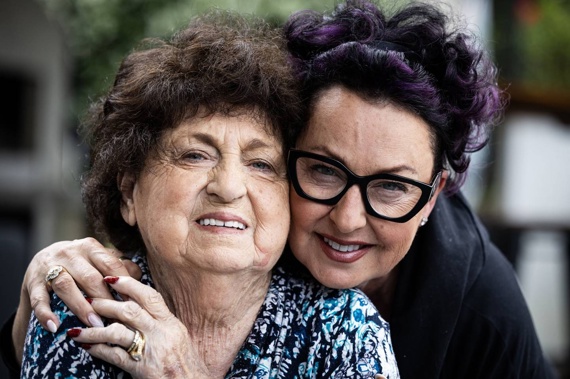
Most kidney transplant recipients live for another 15 to 20 years. A New Zealand woman has survived for 50 years – and has a tip or two on how to live longer. Isaac Davison reports.
On New Year’s Eve in 1973, Minja Ivelja’s pager beeped.
She had a message to call Royal Melbourne Hospital, where she had been in and out of treatment for two years.
Aged 27 at the time, her kidneys were failing. At one particularly bad point, she had slipped into a coma. A Catholic priest had come into her ward and read her last rites.
Ivelja was clinging to life: “I said to the doctor I’m not giving my husband to anybody”.
After calling the hospital on New Year’s Eve, she learned that elsewhere in Melbourne, an 18-year-old motorcyclist had been killed in a crash.
Little else was known about him, except that his tissue was a match for Ivelja.
“We have a kidney for her,” a doctor told Ivelja’s husband Lawrence over the phone.
Transplanted kidneys from a deceased person typically last 15 to 20 years.
Today, at her home on Auckland’s North Shore, Ivelja will celebrate the 50th anniversary of her transplant.
Her family believe that may be a New Zealand record, and possibly a world record for a non-family transplant. (In 2020, a French woman was reported to have lived for 54 years after her transplant, but it is not known whether she is still alive).
/cloudfront-ap-southeast-2.images.arcpublishing.com/nzme/VUJWV66JAJF7XH3SIBF3CII43E.jpg)
Minja Ivelja and her daughter Sandra. The family left the former Yugoslavia as refugees in 1969, settling in Melbourne before later moving to Auckland. Photo / Jason Oxenham.
Doctors and experts could not confirm whether Ivelja had broken a record but said 50 years was at the extreme end for a transplanted kidney.
“[It] is really exceptional,” said Dr Helen Pilmore, a nephrologist at Auckland City Hospital who cares for Ivelja.
“We know that transplantation saves lives and gives people with organ failure a much better quality of life and Minja is a great example of this.”
Ivelja credits her longevity to excellent care from specialists in Melbourne and Auckland.
But she also has another theory: “Maybe it’s the Bacardi, my happy hour”.
Ivelja, now 77 years old, moved to New Zealand 17 years ago to be closer to her grandchildren.
She was born in the Serbian part of the former Yugoslavia, and her husband was from Lastavo, a Croatian island and former military base in the Adriatic Sea.
It was an unlikely match, a sort of Montague-Capulet marriage.
“If you marry a Croatian that is not fitting with mother-in-law or father-in-law,” she told the Herald from her home in Northcross.
Her parents were both in the military, and her mother later joined the resistance in World War II.
She, Lawrence and their daughter Sandra emigrated to Melbourne in 1969 as refugees, arriving with no more than $2 in their pockets. They had to borrow money to taxi from the airport to their new home.
When Ivelja was five months pregnant with her second child in 1971, she began bleeding. She was diagnosed with kidney problems and told she had to abort the baby, which she eventually – reluctantly – agreed to.
She had a year of dialysis, twice a week from 7am to 7pm – “I hated it”. Over two years, she continued to decline and shrunk to a wan 35kg.
/cloudfront-ap-southeast-2.images.arcpublishing.com/nzme/7YZ73G5ZDZC3JPHCD56U627ZRM.jpg)
Minja Ivelja holds a photo taken with her daughter Sandra just before her transplant in 1973. Rundown by kidney failure, she weighed just 35kg at the time. Photo / Jason Oxenham.
Then, after returning from a New Year’s Eve Party, she received the call from the hospital.
Kidney transplants were still a relatively new innovation at the time.
Royal Melbourne Hospital had only begun transplants seven years earlier, led by pioneering nephrologist Dr Priscilla Kincaid-Smith.
“Transplantation had a very bad name round the world,” she said in an interview before her death in 2015, noting how few clinics were carrying out the surgeries and how low their success rates were.
Under Kincaid-Smith’s leadership, the hospital quickly achieved an 80 per cent success rate. By the time Ivelja turned up at the hospital, Kincaid-Smith was an internationally regarded expert.
The operation, on January 2, 1974, took six and a half hours. A few days later, Ivelja’s doctor sent her on an outing to see her husband, who was a waiter at exclusive Melbourne restaurant Maxine’s.
“I remember it was lunchtime when I walked in, my husband was carrying pheasant or something … and he just dropped it on the floor.”
She was discharged from hospital a few days later and never went back.
/cloudfront-ap-southeast-2.images.arcpublishing.com/nzme/FI76S64N4JC3BJ6SGOR33IAULY.jpg)
Milna Ivelja with her dog Harry at her Auckland home. Photo / Jason Oxenham
However, it has not always been an easy ride. Her transplant requires ongoing supervision and a large number of daily medications. She still takes five drugs a day. Decades of steroid use led to complications with her bladder, which was removed six years ago.
Ivelja outlived her husband, a workaholic who loved his food and drink and smoked two packs of Peter Stuyvesant cigarettes a day. He died from prostate cancer in 2008.
Ivelja is frail, with weak bones, but sharp-minded.
“Bring your camera,” she told the Herald photographer when talking about her 50th celebration. “You can take a picture of me in a bikini.”
The milestone also prompts a flicker of sadness. She often thinks about the anonymous young donor who made her long life possible.
“That’s what I’m really sad about and want to know,” she said. “I would love to meet anybody [who knew him]. Tell them ‘Look at what he did for me’.
“I was only 27 years old. [I want to] tell them, I saw my grandchildren. I have a good life. A beautiful life.”
Isaac Davison is an Auckland-based reporter who covers health issues. He joined the Herald in 2008 and has previously covered the environment, politics, and social issues.
Take your Radio, Podcasts and Music with you









